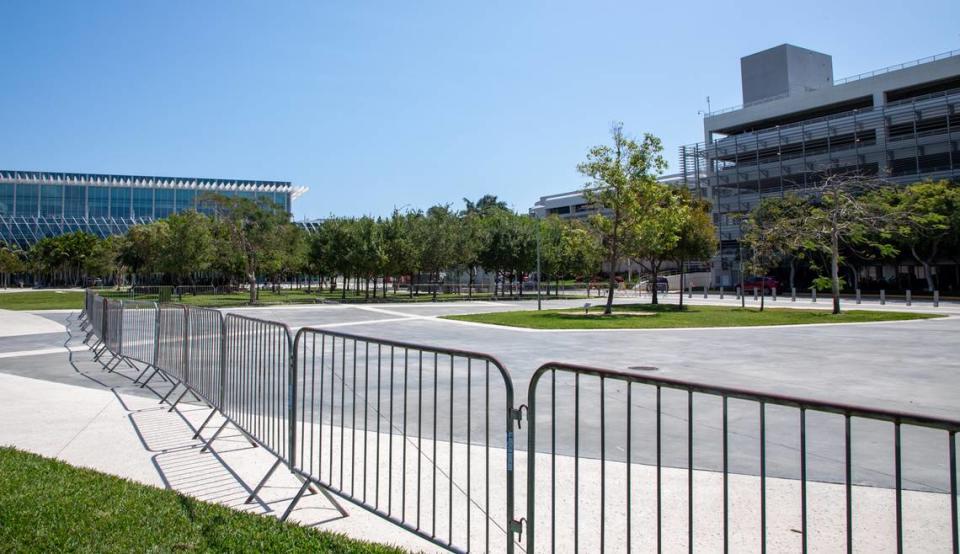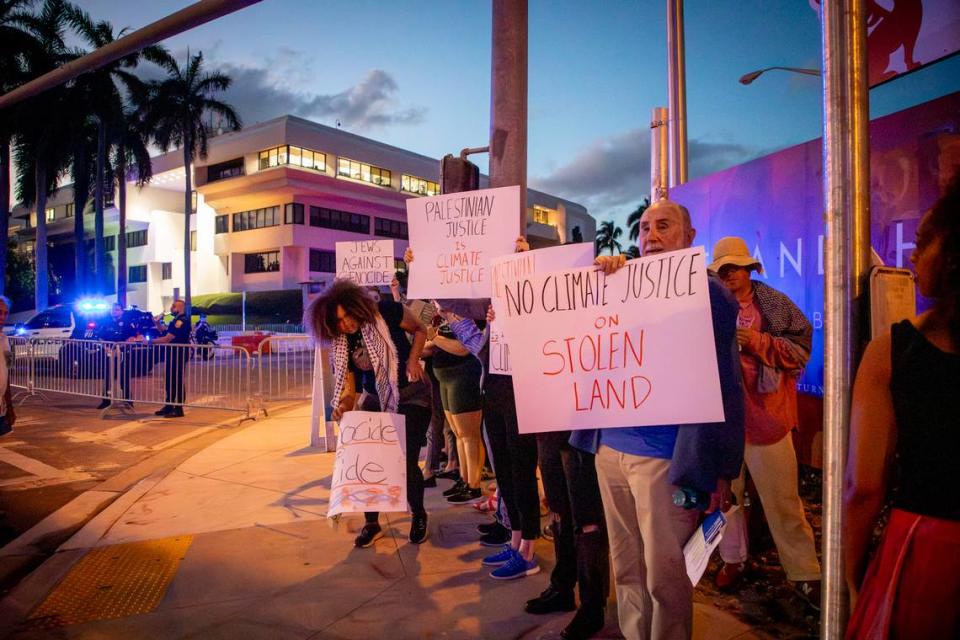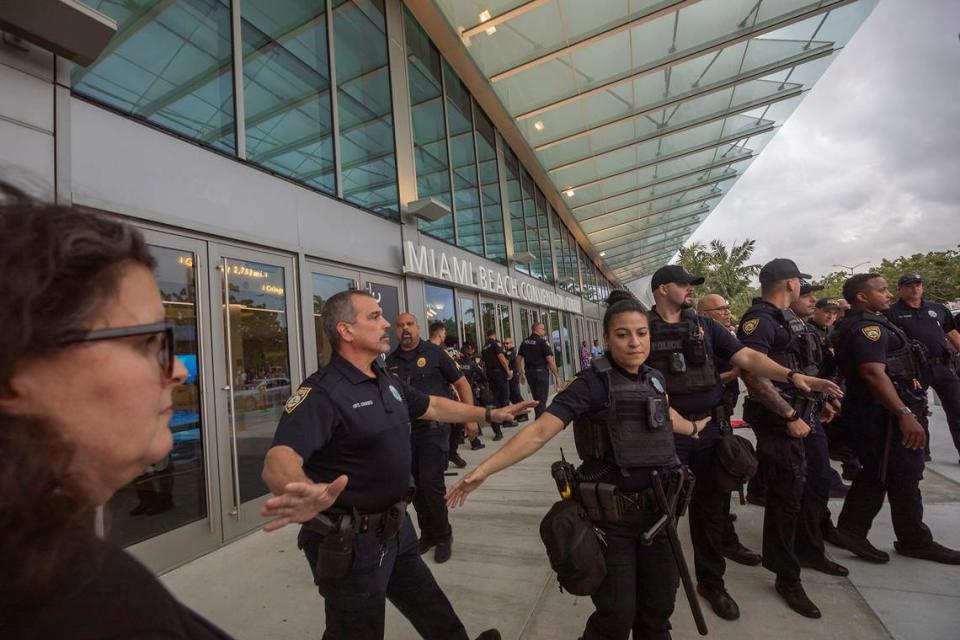Gaza war protesters told to use ‘free speech zone’ outside Miami Beach climate conference
When a small group of pro-Palestinian protesters arrived to the Miami Beach Convention Center on Monday evening, hoping to hand out flyers to attendees of the Aspen Ideas climate conference, they were surprised to be met by police.
They say officers told them that only conference attendees could enter the area around the Convention Center, with one exception: a barricaded “free speech zone” for protesters at the southwest corner of Pride Park.
Members of the group, however, say the zone is too far away from the conference entrance for most attendees to see or hear them.
“We were surrounded by cops. The most people who would’ve seen us there would be the odd man out trying to get their car in the Meridian [Avenue] garage,” said Glory Jones, a protester with Jewish Voice for Peace, referring to a nearby parking garage. “By having borders to where we speak, you’re essentially saying there’s certain zones that free speech doesn’t apply, that the Constitution doesn’t apply.”
A “security zone” around the Convention Center campus was set up at some point Monday afternoon, hours after the conference began that morning. Similar security zones were not in place during the first two years of the conference in 2022 and 2023, except when Vice President Kamala Harris spoke at the conference last year and roads were closed off by the Secret Service.
Miami Beach police set up the perimeter to provide security for “high-level officials and other attendees,” including “federal cabinet level officials, a U.S. governor, foreign dignitaries, and over 50 United States mayors,” police spokesperson Christopher Bess said in a statement Monday night. He did not respond to an inquiry about why a different approach was taken for this year’s conference.
Speakers at this week’s event include U.S. Energy Secretary Jennifer Granholm, U.S. Interior Secretary Deb Haaland, Illinois Gov. JB Pritzker and Lauren Sánchez, vice chair of the Bezos Earth Fund. The conference runs through Wednesday.
Only credentialed attendees can enter the security zone around the Convention Center campus, said Bess, “except for those who wish to exercise their First Amendment right to protest, demonstrate, or leaflet.”
“A demonstration zone has been created within Pride Park to provide a forum to exercise those rights,” he said.

Bess added that demonstrators are also “free to speak to and interact with all convention attendees at the entrance to the Security Zone, through which all credentialed attendees must pass.”
That is ultimately what approximately two dozen pro-Palestinian protesters decided to do Monday, standing in front of a parking garage on 17th Street near Convention Center Drive rather than utilizing the designated protest zone in Pride Park.
On Tuesday morning, conference organizers sent attendees an update, telling them to enter from 17th Street “due to road closures” and to “wear your badge at all times.”

The U.S. Supreme Court has said that governments can limit the time, place and manner of speech if it serves a significant government interest and is “content neutral” and “narrowly tailored.”
Thomas Julin, a First Amendment attorney with the Gunster law firm in Miami, said the constitutionality of free speech zones depends on the specific circumstances. Governments can’t limit speech based on the type of message protesters are espousing, he said, and shouldn’t interfere with their ability to communicate with people they are hoping to reach. Julin also said cutting off the ability to protest on public streets and sidewalks is typically difficult to defend.
Concerns would arise if the restrictions “are actually very content- or speaker-specific, and [police] are just doing things because the [city] officials disagree with the content of the speech,” Julin said.
Mayor wants to regulate protests
Some of the city’s elected officials, including Mayor Steven Meiner, previously raised concerns about a pro-Palestinian protest outside the Convention Center during Art Basel in December.
Days after the Dec. 8 protest, Meiner sponsored an item on the City Commission agenda in which he pointed out that protesters were chanting the controversial phrase, “From the river to the sea, Palestine will be free.” The mayor’s item called for the city to set “parameters for reasonable time, place and manner restrictions for protests, including discussion of incitement to violence vs. free speech.”
At a virtual meeting with residents in January, Meiner said he was “upset” that the protest was allowed to take place directly outside the Convention Center entrance. A group of artists unfurled a banner that read, “Let Palestine Live,” and about 100 people rallied while waving Palestinian flags and holding signs to call for a permanent ceasefire in the ongoing war in Gaza.
During that event, Miami Beach police tried to keep protesters away from Convention Center doors. Police arrested two protesters and charged one with resisting without violence and the other with resisting without violence and disorderly conduct.
READ MORE: Artists and activists stage pro-Palestinian protest in front of Art Basel Miami Beach

Meiner never called the December item for discussion by city commissioners. But he is now sponsoring a resolution on the agenda for Wednesday’s City Commission meeting that calls for the city to create “time, place and manner restrictions” in order to “regulate and control future protests and demonstrations to the fullest extent permitted by law.” The resolution does not refer to pro-Palestinian protests or any specific types of demonstrations.
The mayor’s resolution also calls for police to inform him and city commissioners of all protests planned in the city within one hour of police learning a protest is expected to occur.
In December, Commissioner David Suarez raised concerns that police didn’t tell elected officials about the pro-Palestinian protest outside Art Basel until the day before it was set to take place. Suarez emailed City Manager Alina Hudak to say that “the failure to provide us with this information when it first came to the administration’s attention is very disappointing.”
Miami Beach police did not immediately respond to an inquiry about whether the demonstration zone at the Aspen conference was implemented in response to concerns from elected officials. Meiner and his chief of staff, Veronica Coley, did not respond to requests for comment.
Miami Herald staff writer Alex Harris contributed to this report.
Ashley Miznazi is a climate change reporter for the Miami Herald funded by the Lynn and Louis Wolfson II Family Foundation in partnership with Journalism Funding Partners.

